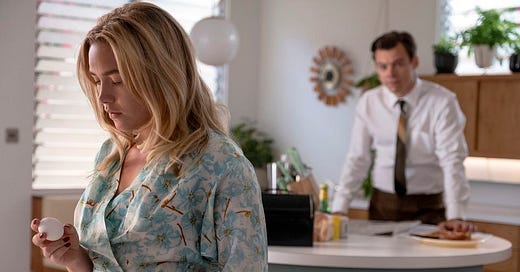Don't Worry Darling
Despite a gorgeous aesthetic and an impressive turn from Florence Pugh, Olivia Wilde's sophomore feature offers shallow social commentary and a weak script.
It’s become extremely hard to even talk about “Don’t Worry Darling" without all the drama and controversy surrounding not just the film shoot but also one of the most chaotic but oh so entertaining press tours in recent memory. It had the drama that’s so juicy, filled with many twists and turns, and it ultimately ended up being far more interesting than whatever director Olivia Wilde was going for with her sophomore feature.
Set in the 1950s the film opens with Jack and Alice (Harry Styles, Florence Pugh), a young married couple living a seemingly idyllic life in the charming neighborhood known as Harmony, located amid the California desert. Their days are full of poolside parties, cocktail nights with friends, gossiping amongst their neighbors, and lots, I mean lots of sex. While Jack drives off to work for his mysterious but charming boss Frank (Chris Pine), Alice stays at home, cleaning, attending dance practice, and chatting with her best friend and next-door neighbor Bunny (Olivia Wilde).
Alice’s world starts crumbling apart when she starts to notice her old friend Margaret (Kiki Layne) exhibiting strange behaviors. Alice soon makes a startling discovery, as she starts to lose her sanity and concerning everyone around her, everyone except for Frank.
'‘Don’t Worry Darling” attempts to address issues of toxic masculinity, gender roles, and sexism, but instead of delving into them, it just uses them as a backdrop. It’s not that the film’s message is bad, it’s that film doesn’t even have the messaging that it thinks it does. The script becomes increasingly shallow as the plot unravels more and more, and the film instead just seems far more interested in creating trippy visuals in an attempt to keep the audience’s attention.
The mystery at the center of the movie is never as intriguing as it needs to be, as it becomes obvious what direction the plot is going as soon as things in Alice’s life go astray. In fact, once things really start to spiral out of control for the characters, that’s when the movie loses itself even more as it gets caught up in its own ambition and perceived self-importance. The characters all feel lifeless, we never really know much about Jack and Alice, and even certain revelations do very little to add anything to their characters.
Even with all of the shortcomings of the script, Florence Pugh rises above the rubble with a genuinely impressive lead performance. Pugh injects as much life and humanity into Alice as she possibly can, it’s because of her that we actually care about the character and feel sympathy for her, rooting for her to escape this hell disguised as paradise. Chris Pine makes for an entertaining addition as the villainous Frank, even if there’s not much to his villainous character, Pine’s performance as Frank makes him a memorable addition. From how he interacts with co-stars like Pugh, Gemma Chan, and Harry Styles, Pine once again proves he may just be Hollywood’s best Chris.
Unfortunately for fans of the music superstar, Harry Styles’ performance falls completely flat. His line delivery ranges from too apathetic in one scene to overdoing it in the next. He feels woefully miscast in his role and as the film progresses it becomes harder to buy him in the role. Gemma Chan and Kiki Layne have proven themselves to be extremely talented in past roles, but their roles here feel like nothing more than glorified extras.
Aesthetically, “Don’t Worry Darling” is beautiful to look at and almost makes the film worth the trip to the theater. Matthew Libatique’s cinematography transforms a seemingly quaint 50s town in the middle of the desert into something filled with unease. Accompanied by John Powell’s creepy score, it is these components above all else that bring any sense of thrills to the movie.
“Don’t Worry Darling” could have worked. It has an interesting concept, it’s aesthetically pleasing, and has some fantastic performances. It’s not like Olivia Wilde is a bad director, as her directorial debut “Booksmart” proved that she’s anything but. The real killer of “Don’t Worry Darling” is that it thinks it’s one step ahead of the audience when in reality it’s two steps behind.






We’ll....now I have to think this one through before I make the trip! Lol